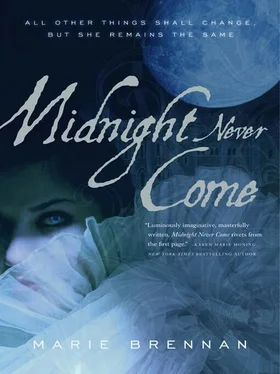But it was the one possibility anyone had offered her, and the only one she was likely to receive. Her best hope otherwise was to bargain her bread for information that might be of aid. There were plenty of courtiers who would have use for it, playing their games in the world above.
When she made her bargains, she would ask after this Francis Merriman. But secretly, so she did not betray her hand to the Queen. Surprise might count for a great deal.
“You should go,” she murmured, and the seer nodded absently, as if he had forgotten where he was, and why. He turned away, and when the door closed behind him, Lune returned to her table and collected the scattered pins that had fallen from her hair.
There were possibilities. She simply had to bring one to fruition.
And quickly, before the whirlpools of the court dragged her down.
RICHMOND PALACE, RICHMOND: September 29, 1588
“…You shall be retained to no person nor persons of what degree or condition, by oath, livery, badge, promise, or otherwise, but only to her Grace, without her special license…”
Deven suppressed a grimace at those words. How strictly were they enforced? It might hamstring his plans for advancement at court, if the Queen were jealous with that license; he would be bound to her service only, without any other patron. Certainly some men served other masters, but how long had they petitioned to be allowed to do so?
Hunsdon was still talking. The oath for joining the Gentlemen Pensioners was abominably long, but at least he did not have to repeat every word of it after the band’s captain; Deven only affirmed the different points that Hunsdon outlined. He recognized Elizabeth as the supreme head of the Church; he would not conceal matters prejudicial to her person; he would keep his required quota of three horses and two manservants, all equipped as necessary for war; he would report any fellow remiss in such matters to the captain; he would keep the articles of the band, obey its officers, keep secrets secret, muster with his servants when required, and not depart from court without leave. All enumerated in elaborately legalistic language, of course, so that it took twice as long to say as the content warranted.
Deven confirmed his dedication to each point, kneeling on the rush matting before Hunsdon. As ordered, he had dressed himself more finely, driving his Mincing Lane tailor to distraction with his insistence that the clothing be finished in time for today’s Michaelmas ceremony. The doublet was taffeta of a changeable deep green, slashed with cloth-of-silver that blithely violated the sumptuary laws, but one visit to court had been enough to show Deven how few people attended to those restrictions. The aglets on his points were enameled, as was the belt that clasped his waist, and he was now a further fifty pounds in debt to a goldsmith on Cheapside. Listening to Hunsdon recite the last words, he prayed the expense would prove worthwhile.
“Rise, Master Deven,” the baron said at last, “and be welcome to her Majesty’s Gentleman Pensioners.”
The Lord Chamberlain settled a gold chain about his shoulders when he stood, the ceremonial adornment for members of the band. Edward Fitzgerald, lieutenant of the Gentlemen Pensioners, handed him the gilded poleax he would bear while on duty, guarding the door from the presence chamber to the privy chamber, or escorting her Majesty to and from chapel in the morning. Deven was surprised by the heft of the thing. Ceremonial it might be, and elaborately decorated, but not decorative. The Gentlemen Pensioners were the elite bodyguard of the monarch, since Elizabeth’s father Henry, eighth of that name, decided his dignity deserved better escort than it had previously possessed.
Of course, before Deven found himself using the gilded polearm, any attacker would have to win through the Yeomen of the Guard in the watching chamber, not to mention the rest of the soldiers and guardsmen stationed at any palace where the sovereign was in residence. Still, it was reassuring to know that he would have the means to defend the Queen’s person, should it become necessary.
It meant that he was not purely decorative, either.
His companions toasted their newest member with wine, and a feast was set to follow. In theory, the entire band assembled at court for Michaelmas and three other holidays; in practice, somewhat less than the full fifty were present. Some were assigned to duties elsewhere, in more distant corners of England or even overseas; others, Deven suspected, were at liberty for the time being, and simply had not bothered to come. A man might be docked pay for failure to attend as ordered — that was in the articles he had sworn to obey — but a rich enough man hardly need worry being fined a few days’ wages.
Despite the revelry, Deven’s mind kept returning to the question of patronage. His eyes sought out Hunsdon, across the laughing, boisterous mass of men that filled the chamber where they dined. The officers of the band sat at a higher table — Hunsdon and Fitzgerald, plus three others who were the company’s standard bearer, clerk of the check, and harbinger.
He could ask Hunsdon. But that would be tantamount to telling the baron that he intended to seek another master.
Surely, though, that would come as no surprise. Hunsdon knew who had secured Deven’s position in the Gentlemen Pensioners.
Deven reached reflexively for his wine, grimaced, then grinned at himself. He did not know how he was going to handle his patronage, but one thing he did know: making any plans about such things while this drunk was not wise. Attempting to ask delicate questions of his captain would be even less wise. Therefore, the only course for a wise man to follow was to go on drinking, enjoy the night, and worry about such matters on the morrow.
RICHMOND PALACE, RICHMOND: September 30, 1588
Deven had been among military men; he should have expected what the morrow would bring. William Russell, who either possessed the constitution of an ox or had not drunk nearly as much as he appeared to the previous night, arrived in his chamber at an hour that would have been reasonable had Deven gone to bed before dawn, and rolled him forcibly out of bed. “On your feet, man; we can’t keep the Queen waiting!”
“Nnnnnngh,” Deven said, and tried to remember if there was anything in the articles that forbade him to punch one of his fellows.
Between the two of them, Colsey and Ranwell, his new manservant, got him on his feet and stuffed him into his clothes. Deven thought muzzily that someone had arranged for a Michaelmas miracle; he didn’t have a hangover. Round about the time he formed up with the others for the Queen’s morning procession to chapel, he realized it was because he was still drunk. And, of course, Fitzgerald had assigned him to duty that day, so he was on display in the presence chamber when the inevitable hangover came calling. He clung grimly to his poleax, tried to keep it steady, and prayed he would not vomit in front of his fellow courtiers.
He survived, though not happily, and passed the test to which he had been put. Moreover, he had his reward; the Queen emerged from her privy chamber just as he was handing off his position to Edward Greville, and she gifted him with a nod. “God give you good day, Master Deven.”
“And to you, your Majesty,” he answered, bowing reflexively; the world lurched a little when he did, but he kept his feet, and then she was gone.
The Queen remembered his name. It shouldn’t have pleased him so much, but of course it did, and that was why she did it; Elizabeth had a way of greeting a man that made him feel special for that instant in which her attention lighted upon him. Even his headache did not seem so bad in the aftermath.
Читать дальше












